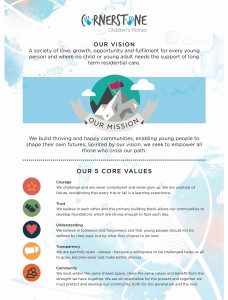Our Vision
A society of love, growth, opportunity and fulfilment for every young person
and where no child or young adult needs the support of long term
residential care.
Our Mission
We build thriving and happy communities, enabling young people to shape
their own futures. Spirited by our vision, we seek to empower all those who
cross our path.
Our Values
Courage – We challenge and are never complacent and we never
give up. We are unafraid of failure, recognising that every
trip or fall is a learning experience.
Trust – We believe in each other and this primary building block
allows our communities to develop foundations which are
strong enough to face each day.
Understanding – We believe in tolerance and forgiveness and that young
people should not be defined by their past, but by what
they choose to do next.
Transparency – We are painfully open – always – because a willingness to
be challenged helps us all to grow, become wiser and
make better choices.
Community – We exist within the same shared space, share the same
values and benefit from the strength we have together. We
are all responsible for the present and together we must
protect and develop our community, both for this
generation and the next.

Engagement
The Cornerstone Way demands a particular type of communication from our people. Our primary aim is engagement, a state in which the world views of a young person and carer overlap with shared understanding of a common goal

Belief
We maintain a position of unconditional positive regard. The young people in our care are good people who may have made mistakes. They want to be accepted as contributing members of society. This overrides any contradictory beliefs that may suggest themselves as the result of observation.

Observation
Every action has a reaction. Observation of this will inform future beliefs, analyses and methods of engagement.
Analysis
Analysis encourages our staff to think in terms of issues that directly affect the young persons well-being.

Enagagment
Engagement is a fluid state in which an understanding is shared at some level between a young person and a carer. It provides a conduit for the delivery of therapeutic care. Engaging effectively requires good ‘self knowledge’ on the part of the carer.


